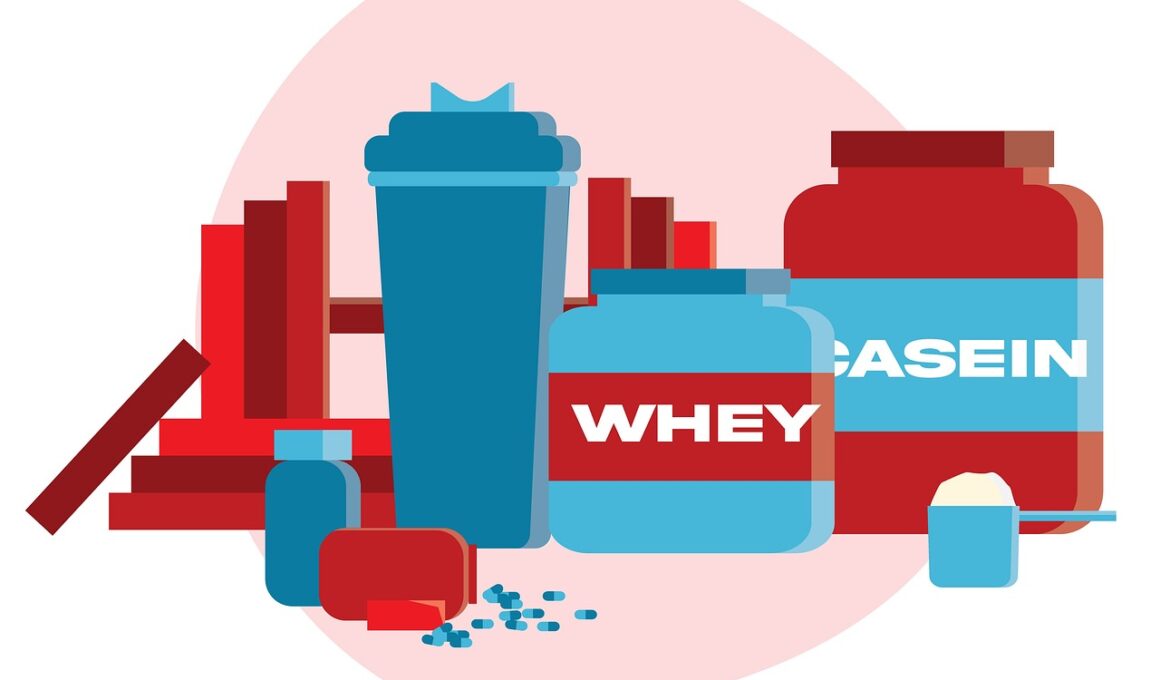Supplements That Enhance Functional Athlete Nutrition
Functional athletes require specific nutrients to support their physical performance and recovery. The right supplements can play a significant role in maximizing strength, endurance, and overall well-being. One crucial supplement for functional athletes is protein powder, which aids in muscle building and repairs. These powders come in various forms, including whey, casein, and plant-based options. Each type has unique benefits tailored to dietary preferences and lactate levels. In addition to protein, creatine is a popular supplement that enhances strength and power during high-intensity workouts. It works by replenishing ATP stores, enabling functional athletes to push harder and longer. BCAAs, or branched-chain amino acids, can also be beneficial. These amino acids reduce muscle soreness and promote quicker recovery after intense training sessions, allowing athletes to maintain high training volumes. Notably, proper hydration is vital, so electrolyte supplements help to replace lost minerals during rigorous physical activity. Aiming for optimal nutrition, vitamins and minerals round out a solid supplementation plan, ensuring adequate intake of essential nutrients. Functional athletes should consider these supplements to improve their overall performance and aid recovery during their training journeys.
A multivitamin is another essential supplement for functional athletes. These tablets offer a convenient way to fill dietary gaps and provide the necessary vitamins necessary for energy production and immune health. Omega-3 fatty acids offer incredible benefits when integrated into a functional athlete’s nutrition routine. Known for their anti-inflammatory properties, they can help alleviate joint pain and improve recovery times. Fish oil or algal oil is often used to reap these benefits effectively. Furthermore, coupling omega-3 supplementation with antioxidants, such as Vitamin C or E, can further enhance recovery. Antioxidants combat oxidative stress that can occur from intense workouts, promoting overall health. Adaptogens like ashwagandha have gained popularity among functional athletes for their stress-reducing properties. They help in maintaining hormonal balance during physically demanding periods. Additionally, probiotics support gut health tremendously, ensuring optimal nutrient absorption. A healthy gut fosters improved performance and recovery. Functional athletes can further boost their hydration with coconut water, which naturally contains electrolytes. This beverage keeps the body hydrated and replenishes necessary nutrients lost during exercise. Well-considered supplementation not only enhances performance but also boosts overall health, vital for any functional athlete’s success.
Protein Needs for Functional Athletes
Protein intake is a foundational component for athletes pursuing functional fitness. Different athletes have varying protein requirements depending on their activity levels and training intensity. Typically, it is recommended that athletes consume between 1.2 to 2.0 grams of protein per kilogram of body weight to support muscle repair and growth. Popular sources of protein include lean meats, dairy products, legumes, and nuts. However, sometimes it can be challenging to reach these levels through diet alone, making protein supplements an effective alternative. Timing of protein intake is equally crucial for athletes. Consuming protein within a 30-minute to two-hour window post-workout can significantly enhance recovery and muscle synthesis. Furthermore, athletes may benefit from distributing protein intake evenly throughout the day to maintain sufficient levels in the bloodstream. This consistent provision results in better muscle adaptation and less breakdown. Innovative protein supplements enriched with digestive enzymes may also aid in increasing protein absorption. Functional athletes should pay attention to their total protein consumption carefully and consider using supplements strategically to maximize their nutritional intake and performance outcomes without meeting nutritional needs solely through meals.
Adequate carbohydrate intake is equally vital for functional athletes, as it serves as the primary energy source during prolonged workouts. Supplements like carbohydrate gels, powders, and energy bars can provide a quick energy boost when needed. These quick-acting carbohydrates are especially helpful during endurance workouts or high-intensity training sessions. Replenishing glycogen stores post-exercise is essential to maintain performance in subsequent workouts. Combining carbohydrates with protein in recovery can promote better recovery outcomes, enhancing overall performance in the long run. Furthermore, functional athletes can consider incorporating beta-alanine into their supplements, which has been shown to improve overall exercise capacity and performance. This particular amino acid supplementation can enhance endurance during high-intensity efforts lasting one to four minutes, helping athletes perform optimally. Being aware of and refining pre-workout nutrition can significantly impact performance. Most athletes benefit from complex carbohydrates and moderate protein before workouts to fuel their performance appropriately. Each supplement serves a unique purpose, allowing athletes to tailor their nutrition strategically. This strategic approach ensures functional athletes maintain high energy levels, recover adequately, and excel in their fitness endeavors.
The Role of Micronutrients in Functional Fitness
Understanding the significance of micronutrients is essential for functional athletes aiming to optimize performance. Vitamins and minerals play critical roles in energy metabolism, muscle contraction, and immune function. For instance, calcium is vital for bone health, and sufficient vitamin D is essential for calcium absorption. Functional athletes should focus on ensuring adequate intake of these nutrients for optimum performance. Iron is another important micronutrient, aiding in oxygen transport to muscles. Iron deficiency can lead to fatigue and decreased endurance, negatively impacting athletic performance. To enhance iron absorption, athletes should pair iron-rich foods with vitamin C sources. Besides these nutrients, magnesium is crucial for muscle function, energy production, and recovery. Magnesium supplementation may help prevent cramps and enhance performance. Antioxidant vitamins such as A, C, and E combat oxidative stress and inflammation caused by intense exercise. Calcium, iron, and magnesium can be obtained from natural food sources, while tailored multivitamins can bridge any nutritional gaps. Functional athletes should prioritize a balanced diet rich in minerals and vitamins. This meticulous focus on micronutrient intake supports overall health and ensures peak performance during training and competitions.
Lastly, proper hydration is a crucial aspect of functional athlete nutrition often overlooked. Maintaining adequate fluid balance enhances performance and supports overall health. Dehydration can impair physical performance, cognitive function, and recovery processes. Functional athletes should not wait until they feel thirsty to hydrate; instead, they should develop a strategic hydration plan before, during, and after workouts. Electrolyte-rich drinks can significantly replenish lost fluids and restore critical minerals that support muscle function. Be mindful that excessive electrolyte intake can lead to imbalances, so moderation is essential. Protein powder drinks may also serve as an effective hydration method, providing fluids and nutrients to meet post-workout repair needs. Sports drinks can be beneficial during prolonged endurance activities to support energy and hydration levels. It is important for athletes to consider their unique needs based on the duration and intensity of their training. Monitoring urine color can serve as an effective guide to hydration levels. Clear or light yellow indicates proper hydration, while dark yellow signifies dehydration. Making hydration a priority ensures functional athletes maintain their peak performance and allows for efficient recovery in competitive environments.
Final Thoughts on Supplementation
Effective supplementation requires a comprehensive understanding of functional nutrition principles. Functional athletes should recognize that supplements are a beneficial addition to a well-balanced diet, not a substitute. The primary focus should always be on whole foods that supply the necessary nutrients for optimal health and performance. However, when a diet falls short of meeting caloric and nutritional needs, targeted supplements can offer considerable advantages. Each athlete’s requirements will vary based on their training intensity, goals, and lifestyle. Therefore, individualized supplementation plans should be developed, ideally with the advice of a nutritional expert. Regularly evaluating performance and recovery metrics can help identify areas for improvement and adjustments in supplementation tactics. Practical approaches in assessing dietary requirements provide a roadmap for athletes to maximize their potential. Moreover, it’s crucial to choose reputable brands with high-quality ingredients to ensure safety and efficacy. Considering the increasing variety of supplements available today can make it daunting for athletes to choose wisely. By prioritizing professional guidance and continual assessment, functional athletes can craft their effective nutrition strategies and ultimately enhance their athletic performance and overall well-being.
Functional athletes can continuously improve their performance through informed supplement choices and an unwavering focus on nutrition. Collaborative efforts between athletes and nutritionists can lead to optimized dietary strategies that empower athletes to reach their fullest potential. Understanding supplementation’s basics allows them to make educated decisions, navigate supplementation options, and utilize them effectively in line with their training programs. Tracking nutrient intake, monitoring performance, and being aware of their specific physiological needs can help athletes fine-tune their supplementation routine for maximum effectiveness. Knowledge about supplements, such as proper dosages and timing, can make significant differences in performance outcomes. It is vital to stay informed about emerging research in sports nutrition to adapt strategies as needed. Supplements complement a broader approach to training, recovery, and nutrition as athletes strive toward their fitness goals. Integrating supplementation within a holistic approach allows functional athletes to harness the power of nutrition fully. Progress should be celebrated as they navigate their journey and continually enhance their training regimen. Embracing nutrition science and utilizing the appropriate supplements contribute to the overall success of functional athletes in their pursuits of excellence.





